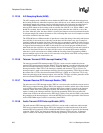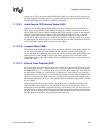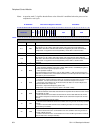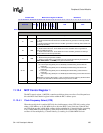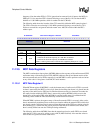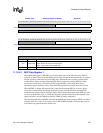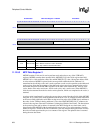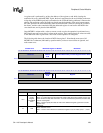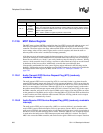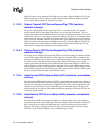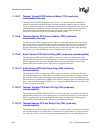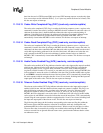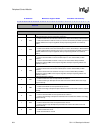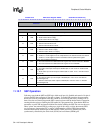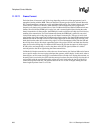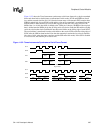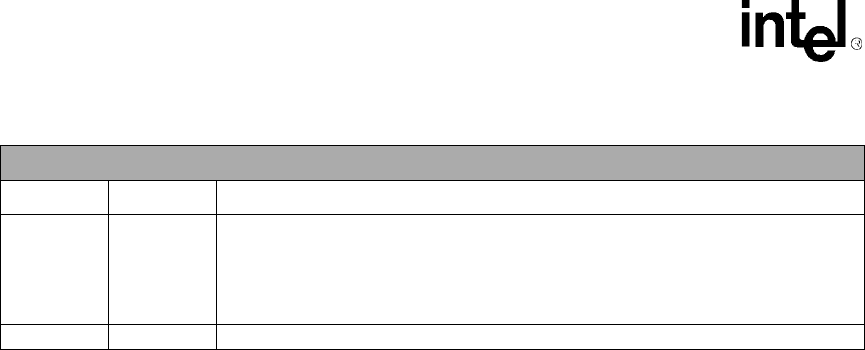
360 SA-1110 Developer’s Manual
Peripheral Control Module
11.12.6 MCP Status Register
The MCP status register (MCSR) contains bits that signal FIFO overrun and underrun errors, and
FIFO service requests. Each of these conditions signal an interrupt request to the interrupt
controller. The status register also flags when transmit FIFOs are not full, when the receive FIFOs
are not empty, when a codec control register read or write is complete, and when the audio or
telecom portion of the codec is enabled (no interrupt generated).
A bit that can cause an interrupt signals the interrupt request as long as the bit is set. Once the bit is
cleared, the interrupt is cleared. Read/write bits are called status bits; read-only bits are called flags.
Status bits are referred to as “sticky” (once set by hardware, must be cleared by software). Writing
a one to a sticky status bit clears it; writing a zero has no effect. Read-only flags are set and cleared
by hardware; writes have no effect. Additionally, some bits that cause interrupts have
corresponding mask/enable bits in the control register and are indicated in the following section
headings. Note that the user has the ability to mask all MCP interrupts by clearing bit 18 within the
interrupt controller mask register (ICMR). See the Section 9.2, “Interrupt Controller” on
page 9-83.
11.12.6.1 Audio Transmit FIFO Service Request Flag (ATS) (read-only,
maskable interrupt)
The audio transmit FIFO service request flag (ATS) is a read-only bit that is set when the audio
transmit FIFO is nearly empty and requires service to prevent an underrun. ATS is set any time the
audio transmit FIFO has four or fewer entries of valid data (half-full or less), and is cleared when it
has five or more entries of valid data. When the ATS bit is set, an interrupt request is made unless
the audio transmit FIFO interrupt request mask (ATE) bit is cleared. The state of ATS is also sent to
the DMA controller, and can be used to signal a DMA service request. Note that ATE has no effect
on the generation of the DMA service request. After the DMA or CPU fills the FIFO such that four
or more locations are filled within the audio transmit FIFO, the ATS flag (and the service request
and/or interrupt) is automatically cleared.
11.12.6.2 Audio Receive FIFO Service Request Flag (ARS) (read-only, maskable
interrupt)
The audio receive FIFO service request flag (ARS) is a read-only bit that is set when the audio
receive FIFO is nearly filled and requires service to prevent an overrun. ARS is set whenever the
audio receive FIFO has four or more entries of valid data (half-full or more), and is cleared when it
has three or fewer (less than half-full) entries of data. When the ARS bit is set, an interrupt request
is made unless the audio receive FIFO interrupt request mask (ARE) bit is cleared. The state of
ARS is also sent to the DMA controller, and can be used to signal a DMA service request. Note that
20..17
Codec
Register
Read/Write
Address
Codec register read/write address.
Read – If a codec write was last performed, contains address of previous register access;
next frame contains the address of the write. If a codec read was last performed, contains
address of the register read.
Write – Used to address a register to perform a read or write.
31..21 — Reserved
(Sheet 2 of 2)
Bits Name Description



